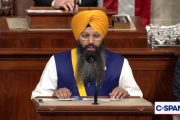
In a last-ditch bid to save the PATRIOT Act, which has been condemned by many members of Congress for its overreaching authorization of domestic spying in the name of national security, Senate Majority Leader Mitch McConnell (R-Ky.) has postponed debate on the controversial law until the week of May 25, days before it expires on May 31.
Two competing pieces of legislation in the Senate would either extend the PATRIOT Act, as is, or remove some of the act’s most intrusive features. McConnell, taking no chances, had his bill, S. 1035 (“to extend authority relating to roving surveillance, access to business records, and individual terrorists as agents of foreign powers under the Foreign Intelligence Surveillance Act of 1978 and for other purposes”) placed on the Senate calendar the day after he introduced it on April 21, thereby avoiding it being bogged down in committee. S. 1035 has only one cosponsor, Richard Burr (R-N.C.) Among other things, it would extend Section 215 of the Patriot Act (which the National Security Agency uses to justify its bulk collection of U.S. phone records) for five years.
The other bill, S. 1123, is a Senate version of a House bill drafted after negotiations between House Judiciary Committee leaders and Senators Mike Lee (R-Utah) and Patrick Leahy (D-Vt.) The House legislation, H.R. 2048, known as the USA Freedom Act, was passed by the House Judiciary Committee on April 30 by a vote of 25-2. The bill would prohibit bulk collection of all records under Section 215 of the PATRIOT Act, prohibit large-scale, indiscriminate collection of data (such as all records from an entire state, city, or zip code), and establish procedures for individual companies to challenge nondisclosure orders.
However, the USA Freedom Act has been criticized by defenders of freedom because not only are its restrictions on the PATRIOT Act minimal, but it also extends portions of the act until 2019.
The USA Freedom Act has bipartisan support in both houses. The principal sponsor of H.R. 2048 is Republican James Sensenbrenner of Wisconsin, but among its cosponsors are such liberal Democrats as Luis Gutierrez (Ill.) and Sheila Jackson-Lee (Texas). Likewise, its nine cosponsors in the Senate span the political spectrum, from conservatives Lee and Ted Cruz (R-Texas) to liberals Leahy and Charles Schumer (D-N.Y.).
Sensenbrenner said of H.R. 2048: “The bill ends bulk collection, it ends secret law. It increases the transparency of our intelligence community and it does all this without compromising national security.”
The bill is expected to easily pass the House, with the support of Speaker John Boehner (R-Ohio), who said: “It’s not everything that I want, but I think it’s a solid agreement.”
Sensenbrenner has come a long way since he was the principal author of the PATRIOT Act in the House on October 23, 2001, which was signed into law by President George W. Bush three days later. The authors of the act attempted to justify its limitations of Americans’ privacy rights by asserting that it was a necessary response to the terrorist attacks of September 11 that year. However, Sensenbrenner later came to regret his actions and expressed his concerns about the act in a June 6, 2013, letter to Attorney General Eric Holder that was prompted by the FBI’s “application for a top secret court order to collect the phone records of essentially every call made by millions of Verizon customers.”
“As the author of the Patriot Act, I am extremely troubled by the FBI’s interpretation of this legislation,” Sensenbrenner told Holder. “The Bureau’s broad application for phone records was made under the so-called business records provision of the Act. I do not believe the broadly drafted FISA [Foreign Intelligence Surveillance Court] order is consistent with the requirements of the Patriot Act. Seizing phone records of millions of innocent people is excessive and un-American.”
Sensenbrenner sponsored a version of the USA PATRIOT Act in the last Congress that passed the House, but was never voted on by the Senate, because of a Republican-led filibuster. Only four Republicans — Ted Cruz of Texas, Dean Heller of Nevada, Mike Lee of Utah, and Lisa Murkowski of Alaska — voted to break the filibuster, along with 52 Democrats and two Independents.
Rand Paul (R-Ky.) was a surprising hold-out, given that his father, former Representative Ron Paul, has expressed strident opposition to the type of government spying the bill would have curtailed. However, Paul opposed the bill for different reasons from most other Republicans who denied it a vote on the floor. He said that he was not against the parts of the USA Freedom Act that would have limited NSA surveillance, but against those parts that would have extended parts of the PATRIOT Act until to 2017. He considered those flaws to be unacceptable.
In reviewing the text of the USA Freedom Act, it appears that — should it come up for a vote in the Senate, Paul will likely again have the same reservations, because it extends parts of the PATRIOT Act to December 15, 2019.
The standoff between supporters of McConnell’s bid to extend the PATRIOT Act and those who seek to partially limit it through the USA Freedom Act is likely to result in a temporary extension of the PATRIOT Act to buy more time. A report in the Washington Times observed:
A majority of lawmakers would probably like to see some snooping powers preserved, but with limits that would prevent the kind of bulk collection that the NSA employs right now. Then there are smaller minorities on both extremes: those who want to see the powers preserved as-is and those who want to end them entirely.
That observation is probably an accurate, but unfortunate, summary of the mindset that has existed in America since the terrorist attacks of September 11, 2001, and the ongoing “War on Terror” that has many Americans more afraid of al-Qaeda and ISIS than they ever were of the communist Soviets at the peak of the Cold War.
Those fears have convinced many Americans that a little “snooping” is necessary to preserve our safety. They would do well to remember the words of Benjamin Franklin: “Those who would give up essential Liberty to purchase a little temporary Safety, deserve neither Liberty nor Safety.”
And, to quote a more contemporary statesman, former Representative Ron Paul reminds us that sometimes the cure is worse than — or a least as bad as — the disease. He wrote recently:
[A] look at the USA FREEDOM Act’s details, as opposed to the press releases of its supporters, shows that the act leaves the government’s mass surveillance powers virtually untouched.
The USA FREEDOM Act has about as much to do with freedom as the PATRIOT Act had to do with patriotism. If Congress truly wanted to protect our liberties it would pass the Surveillance State Repeal Act, which repeals the PATRIOT Act. Congress should also reverse the interventionist foreign policy that increases the risk of terrorism by fostering resentment and hatred of Americans.
Fourteen years after the PATRIOT Act was rushed into law, it is clear that sacrificing liberty does little or nothing to preserve security. Instead of trying to fool the American people with phony reforms, Congress should repeal all laws that violate the Fourth Amendment, starting with the PATRIOT Act.
The Surveillance State Repeal Act (H.R. 1466) was introduced in the House on March 19 by Representative Mark Pocan (D-Wis.) and has 11 bipartisan cosponsors, from liberal Democrats to Walter Jones (R.-N.C.), who scored 78 percent on The New American’s last “Freedom Index.” The bill is in the House Subcommittee on Crime, Terrorism, Homeland Security, and Investigations. It is worthy of the support of all who cherish freedom.
Related articles:
USA FREEDOM Act: Just Another Word for Lost Liberty
USA Freedom Act to End NSA Records Collection Clears Committee
NSA: Warrantless Surveillance Would Continue Without Patriot Act Extension
Forty-two Senators Block USA Freedom Act to Limit NSA Surveillance
. Leahy Offers Weak Bill to Curb NSA Eavesdropping on Americans
USA Freedom Act Gutted Before House Passage; Heads to Senate
House Committee to Study USA Freedom Act to End NSA Surveillance
President Discusses NSA “Reforms” With Lawmakers, Tech
The Path That the Patriot Act Paved
PATRIOT Act Faces Difficulties in House of Representatives
PATRIOT Act To Be Quietly Renewed
House Enacts Limits as Patriot Act Set to Expire




